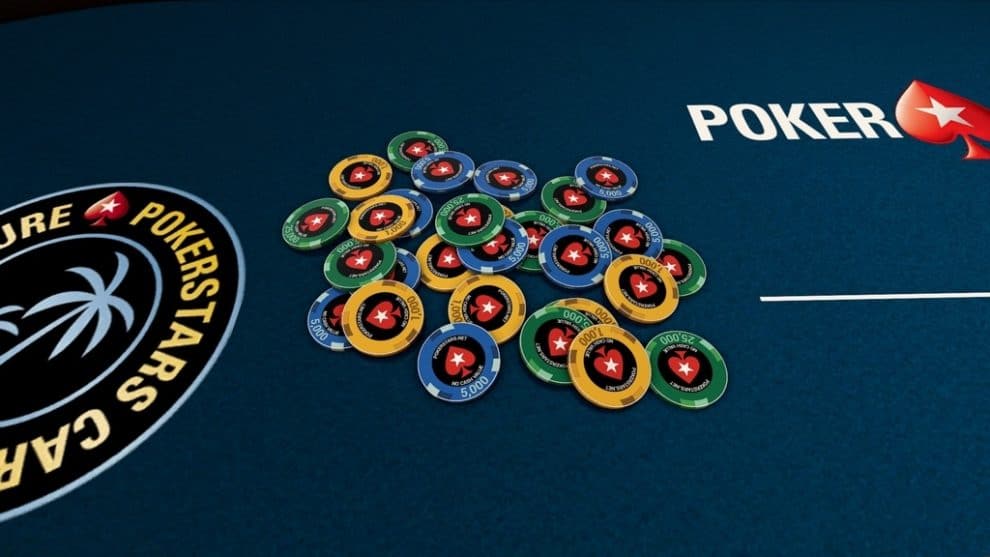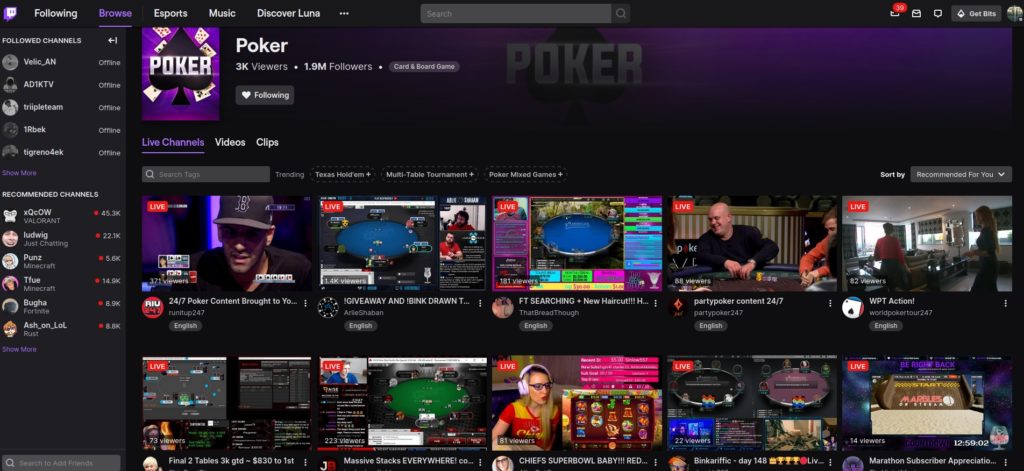
- PokerStars has announced that they’ve ended a 17 year old promotional relationship with 2003 WSOP Main Event winner Chris Moneymaker.
- Moneymaker’s WSOP victory played a big part in kicking off the poker boom of the early 2000s.
- PokerStars has ended a number of traditional promotional deals with top pros as live poker streaming on Twitch has exploded in popularity.
Assuming that you haven’t been incarcerated for the past decade you’re no doubt aware that video games have become a massive business. As part of that popularity, esports–professional video game competitions–have become exceedingly popular as both a spectator sport and betting event. Much of the popularity of esports came about due to live streaming of games on websites like Twitch.tv. Twitch.tv does insane numbers: over 15 million daily visits to watch the streams of over 40,000 game streamers. Popular streamers have become serious influencers and in the process have banked a lot of folding green. Top streamers pull down in excess of $1 million USD per year.
Although the success of Twitch.tv is inextricably woven with the booming popularity of video games a more recent trend is toward ‘diversification’ on the platform. I took a look at Twitch in the wee small hours of the morning on a recent weeknight–we’re talking 2 AM Mountain Standard Time–to get some idea of what streams were most popular. A category called ‘Just Chatting’ which is…uh….’just chatting’ not unlike AOL chat rooms back in the day…had 199k viewers from all over the world. The ‘Music’ section had over 28,000 viewers/listeners enjoying an eclectic range of formats with a sizable representation of DJ sets and EDM. Decidedly analog rooted games such as Chess also had thousands of viewers as did live Sports discussion, live streams of Podcasts and live streams of Fitness workouts. Even obscure things like Tarot Card readings and board games like Risk and Monopoly had a couple hundred people watching. In the ultimate ‘art imitates life’ juxtaposition there’s even a video game called Streamer Life Simulator and–you guessed it–there were a couple hundred people watching streamers play a video game about being a streamer.
Also extremely popular on Twitch.tv: live streamed poker events including live video coverage of ‘in person’ play, streaming coverage of online events and everything in between. In the dead middle of the night the ‘Poker’ channel had 2.9k viewers and overall 1.9 million people follow the feed:

This is where our story begins in earnest. Poker streamers and streamed events are playing an increasingly important part of the online poker ecosystem. This hasn’t been lost on the poker industry or well known professional players: sites such as PokerStars and the World Poker Tour have Twitch.tv streams as does a number of the top pros in the business including Phil Helmuth, Jonathan Little and Daniel Negreanu. Card Player Magazine has even compiled a list of top poker streamers.
The popularity of poker streaming has resulted in a number of other externalities. Most significantly, many of the top poker related businesses are re-thinking long standing sponsorship and marketing deals and devoting more time and resources to the streaming ecosystem. The younger demographics of streaming is just an ancillary benefit.
POKERSTARS REDUCING ROSTER OF SPONSORED PROS
The fact that the popular streamers such as Lex Veldhuis, Ben Spragg and Fintan Hand not only ‘work cheaper’ but likely produce more ‘ROI’ due to their knowledge of social media promotion has definitely caught the attention of online poker powerhouse PokerStars. All three of the aforementioned streamers are sponsored by the company. At the same time, PokerStars has been trimming their roster of sponsored pros. Last May, they ended a 12 year sponsorship deal with Daniel Negreanu. Six months later, the sponsorship contracts of poker ‘power couple’ Liv Boeree and Igor Kurganov were terminated by PokerStars. Negreanu is a Poker Hall of Famer and the three previously mentioned pros have combined for $64.6 million in live tournament earnings.
The final PokerStars sponsorship ‘cut’ of the year was another Poker Hall of Famer and in many ways the most shocking: 2003 World Series of Poker main event champion Chris Moneymaker has parted ways with PokerStars after seventeen years. The poker boom of the early 2000s was brought about by a confluence of factors but you can make a compelling case that Moneymaker’s WSOP main event win was the biggest of all. Moneymaker qualified for the event through an $86 buy-in satellite and would go on to beat 839 other players including respected poker pro Sammy Farha heads up to pocket $2.5 million.
One year later, the World Series of Poker main event attracted a then record 2,576 entrants including many that ‘learned the ropes’ online and were inspired by Moneymaker’s success. Two years later, the WSOP main event would attract an all time high of 8,773 contestants vying for the biggest grand prize in history–$12 million. Although the mainstream media wolud eventually move on from poker as a fad the game and the WSOP are exponentially bigger now than before Moneymaker’s win. In 2019, 8,569 players competed for $10 million USD and the entry field for the main event has never dropped below 6,352.
For the most part, the pros appear to be leaving PokerStars on good terms–at least publicly. Moneymaker’s accomplishments and influence on the game were vividly highlighted by PokerStars even as they were announcing the end of his sponsorship deal on Twitter:
For his part, Moneymaker characterized the split as ‘sad news’ while indicating that he was going to play a little less poker in the immediate future:
Moneymaker released a video statement from his own Twitter account in a tweet that read “2020 has been a year. Sad news. Thanks for everything @PokerStars.” He went on to say that he was likely going to play a little less poker in the immediate future and “explore different endeavors.”
Negreanu landed on his feet, signing a deal with upstart poker site GGPoker just six months later. Since the US is a ‘free country’ it isn’t accessible by American players but one that has quickly become a favorite internationally:
Daniel Negreanu spent about six months as a free agent before signing with another online poker site.
The six-time World Series of Poker bracelet winner announced Wednesday morning that he signed a deal with GGPoker to become one of the site’s ambassadors. Negreanu posted a video to Twitter to announce and explain the decision.
“In a very short time, GGPoker has really made a name for itself in the online space,” said Negreanu in the video that was filmed on the Las Vegas Strip. “In their last GG series, you’re talking about $50 million in guarantees, up from about $3 million the year before.”
Negreanu also noted in the video that he was a fan of the software and the staking option that is available on the platform where you can buy and sell action of other players through the site.
Ultimately, PokerStars is probably making the right move for the future of the company. Since I spend a lot of time bashing various jurisdictions and entities in the sports betting ecosystem for being stuck in the past it would be hypocritical of me to not get that PokerStars is doing precisely that. Everyone has ended a long business relationship of one sort or another and there’s always mixed feelings that accompany it–the longer the tenure the most complex the emotions.
The reality is that the end of one business relationship opens up opportunities for new ones. One of these, interestingly enough, is on Twitch.tv where Negreanu, Moneymaker, Boree and other big names including Phil Hellmuth all have created a presence. Opportunities still abound in the poker world both with existing companies and on a more ad hoc basis. Poker professionals could easily follow in the footsteps of high level chess players who have done surprisingly well on Twitch and elsewhere in the streaming ecosystem. The digital revolution has not only transformed the world economy as a whole but in many ways has completely obliterated ‘barriers of entry’. Now everyone can affordably acquire the ‘tools of production’ and make their own opportunities with potentially limitless reach and scope.









